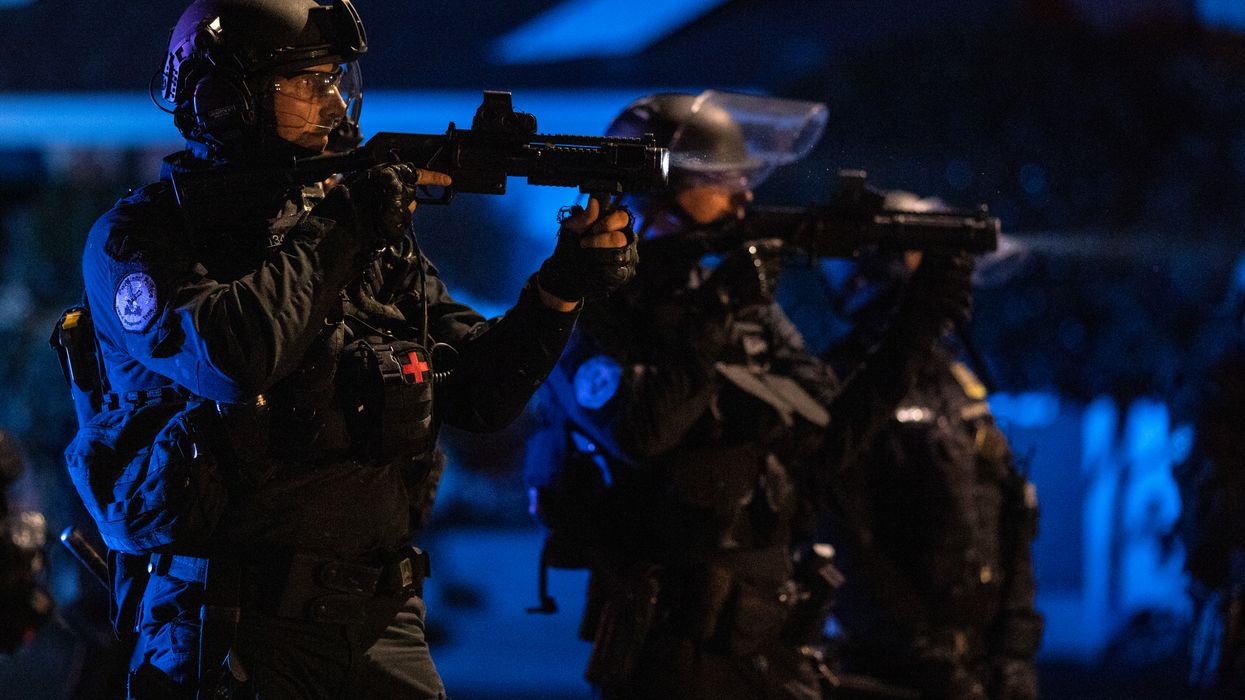It is time for Americans to confront a fundamental question: Who, ultimately, controls the use of domestic force in our democracy?
Across the political spectrum, our nation has a long history of concerns about government overreach in the use of force against citizens. Recent events in Oregon, Wisconsin and elsewhere have again brought these concerns to broad public consciousness.
Yet most citizens normally pay little attention to the complex and contentious issues involving the use of force in our democracy. That leaves us ignorant and disempowered. We have relegated this vital matter to the politicians and the professionals at our peril. This lapse in our collective performance of our civic duty has become urgent. We must act now to refresh our collective memory and to reassert citizen control over the use of force by the government.
We're living in a highly polarized season. Members of the Black Lives Matter movement, and the associated effort to "defund the police," have concluded that an aspect of our current governing system has become so unjustified and destructive that it needs to be fundamentally altered if not abolished. At the same time, millions of other Americans support the more extreme rhetoric of the Trump administration — that it's time to invoke the rarely used Insurrection Act, written two centuries ago to permit presidents to deploy the military to suppress insurrection and rebellion, so the federal government can "dominate the battlespace" and "impose" control on "mobs" in order to pacify what they see as an anarchic threat to democracy.
Many of us feel a deep unease. Could one of today's aggressive, angry flashpoints become a conflagration? What can we do now to prevent escalation? How can we better ensure that the legitimate use of force by our government to prevent injury or wanton destruction doesn't become repression of legitimate protest?
The coronavirus pandemic has exposed just how fragile our public institutions may be. In order to prevent a terrible outcome, we must build resilience by educating ourselves about use of force and the law, and by making sure our voices are heard by those acting on our behalf. Resilience is the essence of prevention. It is the ability to make competent decisions in the midst of a crisis.
How can we pivot? Is it possible to transform what looks like confrontation, mayhem and confusion into a positive step forward for American democracy? Can we step back a minute and find a way to re-establish functional and effective citizen control over the use of force by our government, in our name? "We, the people" need to be the central players in this conversation about what's next.
The complex reality of force is that its use by our government is sometimes necessary — but sometimes illegitimate and destructive of the just aims of government. Protesters say the most emphatic forms of civil disobedience are required to put an agenda for justice in the public eye. Colin Kaepernick's peaceful kneeling protest, they point out, did not generate a national focus on policing practices. The massive and nationwide disruptive protests after George Floyd's death did.
Our concern, as citizens, is not with those who protest. It is with our collective understanding of, and influence on, the use of force by our government. Protestors speak for themselves and are responsible for their actions. But the use of force by the government — done on our behalf, in our name — is justified only when it preserves and enables the larger democratic rights of the citizenry as a whole.
Though our views of individual cases of government use of force and violence may be shaped by our political views and loyalties, our rules for the use of force cannot be partisan. We must actively engage in building a common understanding of the limits of angry protest and the limits of state violence against citizens. Civil disobedience cannot be allowed to overwhelm legitimate democratic processes, and government use of force cannot become repression of legitimate voices in a vigorous and loud debate.
Force, though sometimes necessary, does not "insure domestic tranquility" — one of the reasons for a national government identified in the Preamble of the Constitution. Only genuinely democratic governments can do that. Force is only justified to the degree that it enables peaceful dialogue and protest.
Continued polarization on this issue will diminish our democracy. We citizens must regain our common understanding and united voice on this vital topic. Traditionally, law enforcement has resisted civilian oversight, claiming that professionalization and bureaucratic accountability is sufficient. But this method has clearly failed us. To be sure, use of force is a citizen's problem and subject to citizen input and oversight.
This problem is alarming and overcoming it will be a significant challenge. Yet ignoring it will not make it go away. Citizens must engage. We can do so in various forums and formats, and we must include those who use force.
We call upon a wide range of community groups — protest movements, business associations, ROTC programs, civic organizations, high schools and colleges — to engage. And we call upon police departments, sheriffs offices and National Guard units to accept invitations, and practice the openness and accountability demanded by our democratic ideals.
These organizations must understand that accountability to citizens is not a threat. And that transparency serves them as well as the rule of law in a democracy. We call upon political leaders — mayors and governors, House members and senators — to use their power to convene meetings, study the topic and to lead this process starting at the local level. We, the people, must reassert our voice on this critical issue.
Failure to do so will weaken the most fundamental tenet of our democracy: That "we, the people," are the source of power and that in a democracy, the government only succeeds with our consent.



















Trump & Hegseth gave Mark Kelly a huge 2028 gift